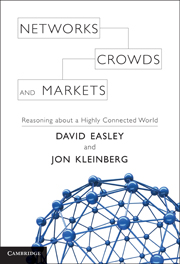Book contents
- Frontmatter
- Contents
- Preface
- 1 Overview
- Part I Graph Theory and Social Networks
- Part II Game Theory
- Part III Markets and Strategic Interaction in Networks
- Part IV Information Networks and the World Wide Web
- Part V Network Dynamics: Population Models
- Part VI Network Dynamics: Structural Models
- Part VII Institutions and Aggregate Behavior
- Bibliography
- Index
1 - Overview
Published online by Cambridge University Press: 05 June 2012
- Frontmatter
- Contents
- Preface
- 1 Overview
- Part I Graph Theory and Social Networks
- Part II Game Theory
- Part III Markets and Strategic Interaction in Networks
- Part IV Information Networks and the World Wide Web
- Part V Network Dynamics: Population Models
- Part VI Network Dynamics: Structural Models
- Part VII Institutions and Aggregate Behavior
- Bibliography
- Index
Summary
The past decade has seen a growing public fascination with the complex “connectedness” of modern society. At the heart of this fascination is the idea of a network – a pattern of interconnections among a set of things – and one finds networks appearing in discussion and commentary on an enormous range of topics. The diversity of contexts in which networks are invoked is in fact so vast that it's worth deferring precise definitions for a moment while we first recount a few of the more salient examples.
To begin with, the social networks we inhabit – the collections of social ties among friends – have grown steadily in complexity over the course of human history, due to technological advances facilitating distant travel, global communication, and digital interaction. The past half-century has seen these social networks depart even more radically from their geographic underpinnings – an effect that has weakened the traditionally local nature of such structures but enriched them in other dimensions.
The information we consume has a similarly networked structure: these structures too have grown in complexity, as a landscape with a few purveyors of high-quality information (publishers, news organizations, the academy) has become crowded with an array of information sources of wildly varying perspectives, reliabilities, and motivating intentions. Understanding any one piece of information in this environment depends on understanding the way it is endorsed by and refers to other pieces of information within a large network of links.
Our technological and economic systems have also become dependent on networks of enormous complexity. This has made the behavior of these systems increasingly difficult to reason about and increasingly risky to tinker with.
- Type
- Chapter
- Information
- Networks, Crowds, and MarketsReasoning about a Highly Connected World, pp. 1 - 18Publisher: Cambridge University PressPrint publication year: 2010
- 2
- Cited by



